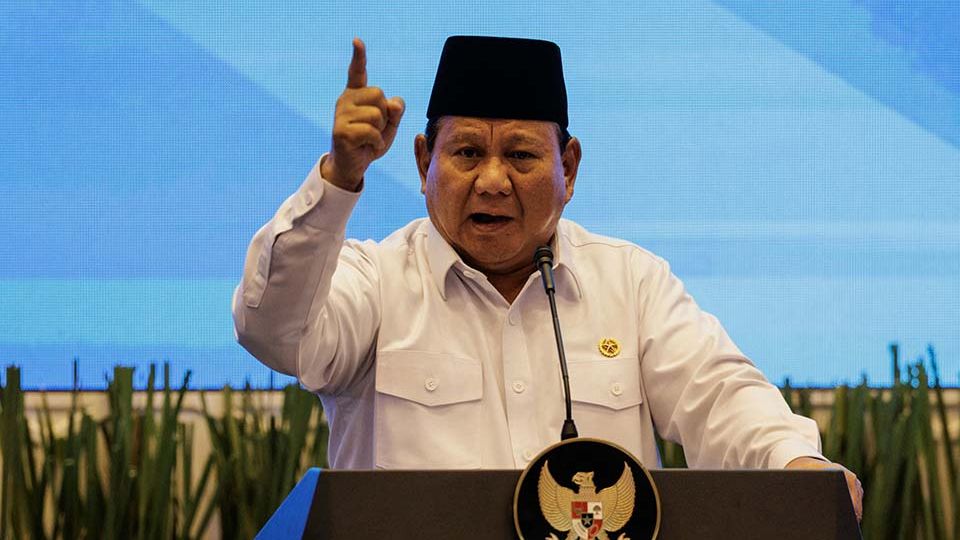March 27, 2025
JAKARTA – President Prabowo Subianto’s administration is facing mounting pressure to overhaul its communication team and change the way the government engages with the public after a series of dismissive remarks from officials.
The President has urged his cabinet twice over the past week to improve communication with the public, first in a speech opening a plenary cabinet meeting on March 21 and then at a closed-door meeting with ministers handling food and agriculture on Monday.
At the Monday meeting, Prabowo called on his ministers and deputy ministers to ensure that the public was accurately informed of the administration’s progress, according to officials who attended the meeting.
The President said many of the administration’s breakthroughs and policies had not been effectively communicated to the public.
“The President asked to improve [public] communication,” Deputy Agriculture Minister Sudaryono said after meeting with the President on Monday. “We must not let the people be swayed by misleading opinions or narratives.”
Prabowo’s orders come as his administration faces a storm of criticism over tone-deaf and brash rhetoric from government officials in response to public criticism, coupled with poor engagement with the public and opaque policymaking.
Presidential Communications Office (PCO) head Hasan Nasbi, for example, faced criticism for his response to the intimidation of journalists at news magazine Tempo, which has been publishing investigative reports critical of the government.
Tempo staff were delivered a box filled with the carcasses of six decapitated rats on Saturday morning, three days after the magazine received an anonymous package containing a decapitated, decomposing pig’s head addressed to Fransisca “Cica” Christy Rosana, one of the hosts of Tempo’s Bocor Alus Politik podcast.
Read also: Govt in hot water over callous public communication
Hasan downplayed the incident, telling reporters on March 20 that the targeted journalists should “just cook” the pig’s head. After a public outcry, the presidential spokesperson said he was seeking to diffuse the sense of terror through his statement.
Hasan is not the first official of the Prabowo administration whose remarks have sparked public outrage.
Army chief of staff Gen. Maruli Simanjuntak experienced a similar outcry after calling public criticism of the contentious revision of the Indonesian Military (TNI) Law, which civic groups slammed for potentially allowing more military officers to be appointed to civilian positions, an “overreaction”.
His father-in-law, Luhut Binsar Pandjaitan, who oversees the National Economic Council and served as a cabinet minister for former president Joko “Jokowi” Widodo, also experienced criticism over his comments last month on the Indonesia Gelap (Dark Indonesia) protest movement.
When questioned by reporters about the protests on Feb. 19, Luhut answered, “If anyone says Indonesia [is in] darkness, the darkness is within you, not Indonesia.”
Narrowing gaps
Even Prabowo has faced public censure over his what critics have called “brash comments”, including when he suggested that critics of his policies, including of his downstreaming drive, were analogous to “barking dogs”.
Some uses of the word “dog” in Indonesian are considered highly derogatory.
FX Ari Prastowo, political public relations lecturer at Padjajaran University, said the series of public relations fiascos should prompt Prabowo to review his presidential communication team and optimize the public relations offices of ministries and state agencies.
He said the government’s communications had failed to build relationships with the public, display empathy for people’s concerns or create space for dialogue.
“Instead, the opposite is happening,” Ari said. “The government is widening the gap with the people.”
Read also: ‘RIP Reform’: Democracy advocates sound alarm over return of New Order
Ari called on Prabowo to show “sincerity and integrity” in engaging with the public to help people understand the realities and encourage them to work together to build the country.
Kunto Adi Wibowo, political communications analyst at polling group KedaiKOPI, called for the government to shift its perspective on public engagement by treating the public as an equal.
“It must start with empathy, by acknowledging that we’re all in the same boat together,” Kunto said. “Whether it’s an economic crisis or any other challenge, a leader can’t assume they know everything.”


